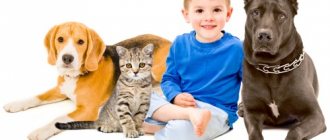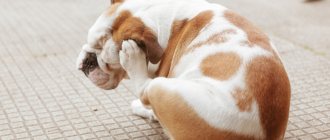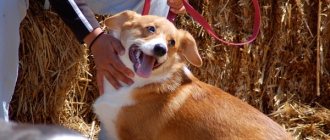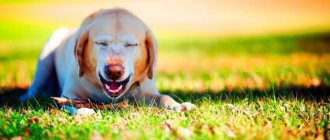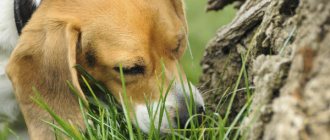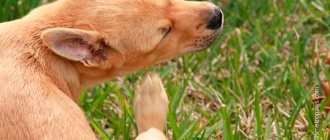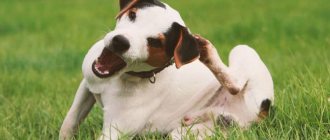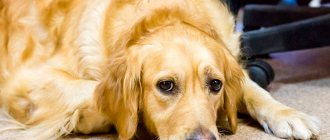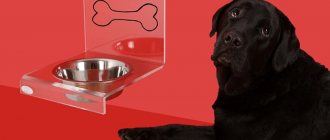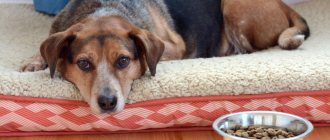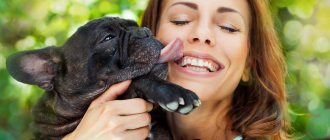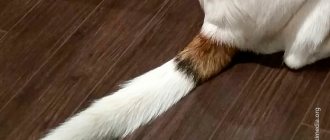General information
People who are not very familiar with dogs and their behavior will not find it strange that a dog often licks and smacks its lips. Sometimes this is due to animal reflexes, and sometimes it can be a sign of stress or illness.
Intense salivation, provoked by behavioral or reflexive reasons, causes the dog to lick itself frequently. Some health problems also result in overactive mucous membranes.
The cause for concern is the constant nature of this habit, which distinguishes the manifestation of the simplest reflexes (hunger, thirst) from a possible health problem.
Physiological needs and reflexes
Salivation in a dog is facilitated by signals from the central nervous system:
- When the taste or olfactory receptors are irritated, a copious secretion of saliva begins, which the dog licks off, sometimes smacking its lips. Hypersalivation, increased production of saliva by the glands, also occurs when the animal is anticipating a tasty treat. Excessive salivation when the dog is hungry and smells food is an unconditioned reflex. If feeding is organized at the same time of the day, then when this hour comes, the dog, under the influence of a conditioned reflex, constantly licks itself in anticipation of food.
- Thirst is another natural reason why dogs lick their lips. In the heat, with a lack of water, drying out of the mucous membranes can occur. To moisten their dry nose, they constantly lick it.
- When you are very tired, the mucous membranes also dry out, and the need to lick your lips arises.
- A dog's nose is designed in such a way that it senses odors better and more clearly if it is wet. When a dog licks too intensely, it may be trying to sniff something and catch an interesting aroma.
- In some breeds of dogs with an abundance of folds on the face (St. Bernards, Newfoundlands), saliva accumulates in these very skin folds. By constantly licking and swallowing saliva, they simply get rid of excess moisture.
All of the listed natural causes can be easily eliminated - feed the dog and give him water to drink.
If his behavior does not change, the need to lick frequently persists even when the pet is full and not thirsty - psychological or other health problems can be suspected.
Reasons for the appearance of the reflex
As is known, primary reflexes manifest themselves at an unconscious level. But without reasons, which, in turn, can provoke a reaction, there are no reflexes.
Hunger and thirst
Like a person, a dog is positively receptive to various tasty odors, only the animal’s sense of smell is many times stronger and more subtle. When an animal feels hungry, the mucous membranes begin to work more intensely, saliva is produced, and the nose becomes more moist. As a reflex, the dog will often swallow saliva and lick its nose to renew the moist coating, which helps enhance the sense of smell.
It is important to note that in a pet such a reaction occurs only when a stimulus appears and when it is hungry. The constant manifestation of this reaction should not be attributed to hunger. Drying of the nose due to decreased activity of the mucous glands is another reason why a dog licks its nose. This reaction may also indicate thirst. Licking and smacking, especially in hot weather, indicates the pet's need for moisture.
Thirst can be quite dangerous, so it is very important to ensure that the animal has access to water at all times. Refusal or limited fluid intake may indicate a serious illness.
For dogs suffering from chronic diseases, it is recommended to give only filtered water.
Stress and anxiety
An animal experiencing strong emotions (fear, excitement, impatience), or under stress, may lick not only its nose, but the entire face. Emotional arousal forces the body to work more actively, which is why the pet begins to swallow more often. Sometimes, from particularly strong excitement, the dog begins to smack its lips.
Why do dogs lick their feet and what does it mean?
There are several reasons why a dog often licks a person's feet.
- Salt: the diet does not have enough sodium and chlorine, which are necessary for the normal functioning of the stomach; without them, the body does not produce hydrochloric acid, which means that the process of digesting food is disrupted and appetite worsens. By licking sweat from its feet, the dog tries to get the substances it needs.
- Smell: in the wild, strong odors give away the animal; instinct forces the dog to take care of the cleanliness of the owner’s feet so that the specific aroma does not give them away to the enemy.
- Fear: a humiliated, timid touch of the tongue may indicate disturbances in the relationship between man and animal, frequent aggression directed at the dog; serious correction of human behavior is required.
- Wounds: Infected scratches or wounds on the legs prompt the four-legged "healer" to use the most powerful healing agent at his disposal - his own saliva.
Legs are the most accessible part for showing special feelings to the owner
On a note! Surprisingly, even if there is no visible damage, the dog may begin to show increased interest in that part of the body where the inflammation is just beginning, as if it senses an approaching attack of arthritis or gout, trying to “remove” the pain.
Causes of the symptom
If all of the above can be excluded, then this behavior may be a sign of a disease or mechanical damage.
Food allergies
The manifestation of allergies after a change in diet happens so often that it can be called a kind of anti-norm. A decrease in food quality or an unusual (for example, dietary) diet can be quite painful for your pet. Experienced breeders and dog breeders warn that a change in diet should be introduced gradually, over a certain period of time.
If there is no time for a gradual change in diet, you need to ensure that the dog consumes a large amount of fluid and reduces stress. The presence of itching, dermatitis, swelling of the mucous membranes and tearing will help make a correct diagnosis. Often, due to itching, the pet licks its limbs so much that wounds and ulcers form.
Oral diseases
All sorts of problems with teeth, gums, and oral cavity affect the taste of saliva and the smell of your mouth. By licking, the animal tries to calm down and improve its sense of smell. Halitosis can also be caused by a bacterial infection.
Impaired kidney and liver function
Excessive salivation can be a sign of very serious problems with the dog’s kidneys, genitourinary system, and liver. During the period of licking the muzzle, other symptoms do not yet appear, so at the same time you need to pay attention to the frequency of urination, the ratio of the amount of fluid consumed to the amount of urine, and the color of the mucous membranes.
Poisoning
Excessive salivation in parallel with vomiting, diarrhea, decreased body temperature and convulsions, pallor or bluish skin indicates poisoning. It is a mistake to believe that a dog can be poisoned or that it can only pick up something on the street. Potential sources can be found in any home: household chemicals, spoiled food, medications, pest control, even chocolate, which is a terrible poison for dogs.
Foreign object
Smacking, constant licking, depressed mood, nausea and lack of appetite may indicate that there is a foreign object in the dog's digestive system. Your pet may swallow something while playing with a stick outside, or it could be any other small object accidentally dropped in the house. If it doesn't come out naturally, it can get stuck in your teeth or block your intestines. In such cases, it is best to seek advice from a veterinarian.
Yawning as a way to communicate with a dog
Communicate with your dog using yawns
Since such a dog gesture as yawning has so many different explanations and interpretations (with the exception of yawning as a symptom of illness), we suggest that you use it to communicate with your dog in a language that it understands. This way you can calm your dog down and show him that you are not a threat to him - to do this you need to start yawning in response to him
At the same time, it is very important not to scare the animal and not try to reduce the distance between you. In fact,
a sharp reduction in the distance between the dog and the object (you) does not at all indicate that you are in a friendly mood in the dog’s understanding; rather, it indicates that you are behaving in a way that is incomprehensible to the animal and therefore poses a threat to it.
So, try to defuse the situation with a yawn. Rest assured, the dog itself will shorten the distance and even try to jump on your chest (find out how to stop dogs from jumping on their owner’s chest).
If you meet a strange dog that is not very friendly towards you, try to yawn in response to it, but at the same time avert your eyes to the side, trying not to meet its gaze. This technique is appropriate for a static position, but if the animal is aggressive against you (and, do you know what breeds of dogs are the most aggressive?) - in this case, do not yawn in the literal and figurative sense of these words...
Video of dogs yawning
Today we talked about why dogs yawn, what yawning means in dog language, and how you can communicate with your dog using a reciprocal yawn. We hope that our tips and recommendations will help you better understand your pet.
In what situations does your dog yawn? Share your observations with us.
How to fix the problem
If you don't know why your dog is constantly licking, consider all possible causes and rule out unlikely ones. If you become ill, consult a specialist immediately. If possible, carefully examine your pet at home in order to take rescue measures (for example, in case of poisoning) immediately. If health problems, mechanical damage and stress can be ruled out, then try to solve behavioral problems by redirecting attention.
Dogs begin to lick themselves, people, and objects, usually out of boredom. This can be dealt with in two ways (preferably in combination): if possible, engage in your pet’s leisure time more actively and render the object of enthusiastic licking unusable. To do this, you can use special repellent sprays with citrus scents or pepper tincture. They should be used extremely carefully so as not to harm the pet.
You can seek help from a professional dog handler who will help discipline the animal. If the problem is psychological in nature, a very subtle professional approach is needed. Therefore, do not self-medicate, but immediately contact a specialist and strictly follow his recommendations.
Recommended Posts
What kind of nose should a healthy dog have and why is it wet?
Why does a dog whine and tremble, as if with a chill?
Why does your dog constantly shake his ears and what to do about it?
Why does my cat constantly meow for no reason?
Why doesn't a dog drink or 3 reasons for refusing water?
Fighting a bad habit
If there are no visible serious prerequisites for such behavior, you need to take simple actions:
- provide your pet with fresh water;
- inspect the oral cavity for the presence of foreign objects;
- give the dog a rest and eliminate the causes of stress;
- in case of allergies, give your pet antihistamines;
- change the diet or change the food.
When a pet licks itself and other objects simply out of boredom, you need to diversify its leisure time with games or walks.
In the case of other behavioral and psychological reasons that provoke frequent licking, it is better to contact a professional dog trainer to correct the dog’s behavior.
If the owner notices the animal’s habit of constantly licking its face and swallowing saliva, it is necessary to consider all possible reasons in order to exclude the most unlikely ones.
Before contacting a veterinarian, you should carefully observe your pet and note other accompanying symptoms that indicate a health problem. This is necessary for an accurate diagnosis.
Drowsiness, a gesture of reconciliation or joy: why do dogs yawn?
In addition to the obvious, that is, drowsiness, dog behavior experts name several other reasons for yawning, and often the motives for this action lie much deeper than one might imagine. Norwegian cynologist and dog body language expert Turid Rugaas is convinced that yawning is a calming signal, a so-called “gesture of reconciliation,” similar to licking the nose or looking away, which a dog conveys to its relatives and to humans.
“As pack animals, dogs must be able to communicate and cooperate, they transmit such signals in order to avoid conflicts and live in harmony,” writes Turid Rugaas. According to her, dogs use more than thirty calming signals, or “gestures of reconciliation,” which, apparently, are innate. This explains why very young puppies understand signals like yawning even when they see them for the first time.
“A dog may yawn when you lean over it, when you are angry with it or yelling at it during a family argument, when the dog goes to the vet, when someone walks straight at the dog, when the dog is excited with happiness and anticipation - e.g. doors while getting ready for a walk, when you ask the dog to do something that he doesn’t want to do or forbid him to do something that you don’t like, when training is too long and the dog gets tired and in many other situations.”
Yawning is a kind of signal to calm down, directed both inward and outward. If your dog is very anxious, scared or excited, yawning can help him calm down. When experiencing stress, a dog, with the help of a yawn, tries to send a signal to other members of its “pack” that it is not a threat, asking them to retreat or reduce the intensity of their emotions.
If the dogs are playing and starting to take liberties with each other, yawning helps defuse the situation. By yawning, the dog calms down on its own and shows its partner that its behavior is just a game, but not a threat. When a dog is anticipating an interesting walk and is fussing around the exit in excitement, he may yawn again and again. These actions help her cope with the tense anticipation of the owner’s cherished command.
Do you know where else you can find a lot of yawning dogs? At the training ground. Yawning in this case is not a sign of fatigue, but of severe stress, which occurs when inexperienced owners use too stern a voice when working on the “Sit” or “Stand” commands.
Dr. Stanley Coren, an authority on dog behavior, writes: “A dog perceives a fearful tone of voice as a signal that he may simply die if he moves from his place. This is why you see so many dogs yawning during endurance exercises in a beginner group. Dogs get nervous when their owners try to control them with a too stern, commanding voice.”
The situation changes as owners learn to use a more friendly, affectionate intonation: the number of yawning dogs in a group decreases sharply. According to Dr. Koren, in this case the dog's behavior can be interpreted as "I'm very stressed, nervous or scared right now."
In order not to create unnecessary tension, experienced dog handlers recommend not only using a softer intonation in work, but also making classes interesting by taking frequent breaks for play and rest.
What does it mean when a dog yawns after its owner yawns? This happens because dogs are able to empathize with humans, as recent research shows. Scientists from the University of Porto, Portugal, found that dogs yawn even when they simply hear the sound of a yawn.
“Our findings suggest that dogs may have the ability to empathize with humans,” said lead researcher and animal behaviorist Karin Silva. In her opinion, the basis of the close connection between man and dog, which arose and strengthened throughout the entire period of domestication, that is, for more than 15,000 years, lies precisely in interspecies empathy.
Owners of small dogs are very amused by the squeaking and creaking sounds that their pets make when they yawn. Among dwarf dogs, there are few who like to yawn quietly; they almost always try to attract as much attention to themselves as possible. On forums, people often vividly describe the trills their dogs make at this moment and try to find explanations for this behavior, but I have never been able to find scientifically proven information about the differences between a silent and a loud yawn.
Dr. Koren, however, views this behavior separately and calls it a "yawn with a howl." In his opinion, such a yawn should be translated as “Oh, I’m delighted! Let's do it! The idea is great!”, and he talks about the extreme degree of excitement of the dog, awaiting some very pleasant event.
And if a “loud” yawn is an expression of happiness in anticipation of a walk, a car ride or a crazy game, it becomes clear why dogs yawn much more quietly while washing their paws.
Liked? Subscribe to my YandexZen channel and see pictures on Instagram.
© 2019-2021 Alexander Smirnov. Respect the work of the author: copying any part of the material is possible only with indication of authorship and a link to the source.
Dog handler Alexander Smirnov
From childhood, as far as I can remember, we had dogs in our house. Their presence was something ordinary, natural, without which you couldn’t imagine your life. Small, large, fluffy or smooth-haired - a considerable part of my memories are connected with them in one way or another...
Possible reasons why a dog constantly licks itself
- First of all, owners should think about whether the dog’s diet meets the given standards? Have you given your pet new food or products? Such behavior may well be the result of aversion to a certain product or a food allergy.
- In some cases, the owners of the animal simply do not notice that their pet is just suffering from thirst, forgetting that a bowl of water should always be within reach.
- Often, a dog licks its lips due to some dental problem, such as loose or tooth loss.
- A similar symptom can also be caused by many infectious and bacterial diseases.
- Often, constant licking indicates food or some other type of poisoning. Try to remember if the dog picked up any food items on the street or came into contact with dangerous toxic substances (household chemicals, rodent poisons).
- Chronic forms of kidney or liver disease also cause your dog to lick his lips. That is why, if this symptom occurs in an animal, it is so important to take it to the veterinarian in time - the presence of such serious problems can be confirmed or refuted only after a laboratory blood test.
- The problem may also lie in the psychology of the animal. If your dog licks his lips frequently, this may indicate an overly dependent nature. Researchers say this behavior is very common in puppies and adults, who tend to be submissive. Owners often enjoy this behavior as a sign of affection, but experts say that excessive licking is often undesirable. This is explained simply - excessive submission can over time transform into active superiority. If the owner encourages such displays of affection, the dog quickly learns that licking is a sure way to attract attention.
- Another reason why a dog licks itself too often is heartburn. In such cases, you can try giving your dog food soaked in water or making the diet less fatty.
- Hyperacid gastritis also often leads to increased salivation. As a result, the dog licks itself frequently. This type of gastritis is characterized by the fact that increased secretion of gastric juice and hydrochloric acid occurs in the animal’s body.
- Another common cause of this symptom is an attack of nausea. If the dog refuses to eat, it needs a professional examination. If the appetite remains the same, there is a high probability that the animal is suffering from gastritis or indigestion of a certain food.
- A dog may start licking excessively if it has a foreign object stuck in its mouth. This often happens when chewing a bone. That is why, before sounding the alarm, the owner should put on rubber gloves, open the animal’s mouth and examine it for the presence of foreign objects.
Why does a dog lick his lips?
